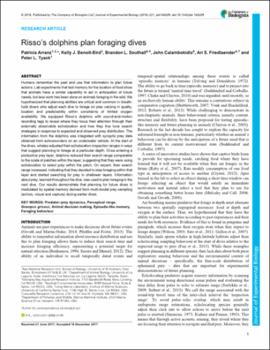Risso's dolphins plan foraging dives
Fecha
2018Resumen
Humans remember the past and use that information to plan future actions. Lab experimentsthat test memory forthelocation offood show that animals have a similar capability to act in anticipation of future needs,butlessworkhasbeendoneonanimalsforaginginthewild.We hypothesized that planning abilities are critical and common in breathhold divers who adjust each dive to forage on prey varying in quality, location and predictability within constraints of limited oxygen availability. We equipped Risso’s dolphins with sound-and-motion recording tags to reveal where they focus their attention through their externally observable echolocation and how they fine tune search strategies in response to expected and observed prey distribution. The information from the dolphins was integrated with synoptic prey data obtained from echosounders on an underwater vehicle. At the start of the dives, whalesadjusted theirecholocationinspectionrangesin ways that suggest planning to forage at a particular depth. Once entering a productive prey layer, dolphins reduced their search range comparable to the scale of patches within the layer, suggesting that they were using echolocation to select prey within the patch. On ascent, their search rangeincreased,indicatingthat they decided tostopforagingwithinthat layer and started searching for prey in shallower layers. Information aboutprey,learnedthroughoutthedive,wasusedtoplanforaginginthe next dive. Our results demonstrate that planning for future dives is modulated by spatial memory derived from multi-modal prey sampling (echoic, visual and capture) during earlier dives.






